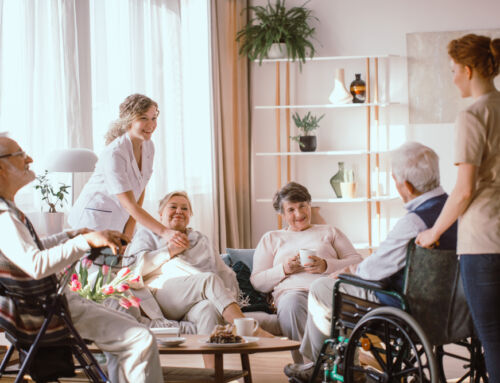We’ve been hearing about various types of discrimination in the new headlines a lot lately. From issues of pay equity to debates around race, disability, and sexuality, Americans typically have vocal opinions about hot button topics. However, there is one demographic that frequently confronts discrimination, but it rarely makes the front page of the paper: seniors. Yes, as with many of the “-isms,” ageism, or age discrimination, is alive and well in our country, and it’s an issue that needs to receive much more attention in order to affect meaningful societal change.
>> Related: The Voice of the Resident: Why the Senior Living Industry Should Listen
Truly hurtful stereotypes
The “sticks and stones” schoolyard rhyme may not hold true when it comes to emotionally hurtful language, portrayals and actions targeting older people.
A 2001 study conducted by researchers at The Duke Center for the Study of Aging at Duke University examined the everyday types of ageist behaviors experienced by older Americans. The researchers surveyed 84 people who were age 60 and over, and their responses to a 20-question assessment were startling.
- 80 percent of survey respondents said they had experienced ageism, for example, a person assuming that because of the senior’s age, they must have mental or physical deficiencies.
- 58 percent of the seniors in the study said that they had been told a joke that mocked older people, behavior that the study determined was the most frequent form of ageism encountered by older people.
- 31 percent of respondents said that because of age discrimination, they had been ignored or not taken seriously by another person.
But the long-term impact of ageism goes beyond mere offensive stereotypes of seniors. In fact, a 2002 study by psychology researchers in Yale University’s department of epidemiology and public health determined that age discrimination can potentially shorten seniors’ lives. This team of researchers followed 660 seniors age 50 and older. Among the study group, seniors who held more positive views about the aging process actually lived 7.5 years longer than people who negatively perceived aging.
On the flip side of the 2001 Duke study, this 2002 Yale research found that seniors who commonly encountered positive stereotypes about the aging process had markedly better memory and balance than their peers. So, it is not too surprising that the researchers also discovered that seniors with negative self-perceptions about growing older had worse memories and often experienced feelings of worthlessness. Although a negative self-perception among some seniors cannot be fully explained by age discrimination, it most certainly plays a role.
>> Related: The Senior Loneliness Epidemic & Solutions to “Cure” It
Changing mindsets
Ageism, unfortunately, is engrained within our society and our institutions, and it is a type of prejudice that is too commonly accepted or simply ignored. Whether it is the portrayal of seniors in the entertainment industry as cranky, dependent, and forgetful, the derogatory language we see on “over-the-hill” birthday cards and anti-wrinkle cosmetics ads, or perhaps most damaging, policies and laws that fail to protect the rights, worth, and dignity of the older generation, we have a long way to go before age discrimination is erased in our country.
It is healthy to keep a sense of humor about confronting your own aging process—I don’t mean to suggest otherwise. And there are certain undeniable realities when it comes to the common health and physical challenges that occur as we get older. But prejudice and age discrimination are real, and something has to change. After all, seniors make up the fastest-growing demographic in the U.S. According to census data, there are approximately 47.8 million people age 65 and older in the United States—that’s 14.9 percent of the total population—and the 65 and older population grew 1.6 million from 2014 to 2015.
But beyond the sheer numbers, addressing ageism and its related issues is not only the right thing to do, it can benefit society as a whole. As with any form of prejudice, allowing ageism to persist means we miss the opportunity to benefit from each person’s talents and contributions. We must raise our consciousness that older adults are a diverse group with much to offer. As a country, we must ensure that adequate social and physical support systems are in place to bolster seniors’ ability to contribute their many skills and wealth of knowledge, allowing them to continue to have a higher purpose in life, regardless of the number of candles on their cake. Intergenerational programs are a fantastic example of how seniors can not only be included but be integral in their contributions to society.
>> Related: Common Ground: Intergenerational Programs Benefit Both Children & Older Adults
When older adults are viewed positively by the world around them, it has been proven to benefit both their physical and mental health; it also will encourage our society to be more understanding and accommodating of seniors’ needs overall, and place a higher value on their many gifts—creating a world where they are no longer dismissed or ignored, but rather, revered for their unique perspectives on life.






